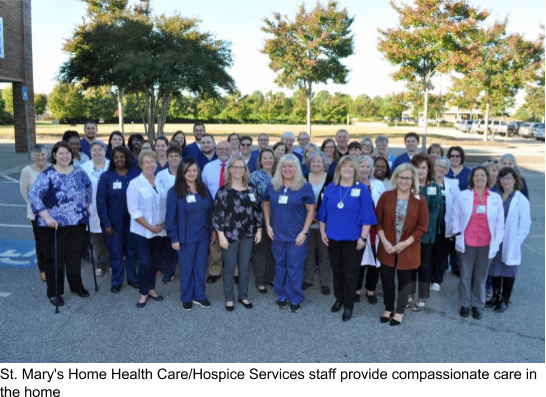St. Mary's Home Health Care & Hospice Services Brings Care to Your Door
January 1, 2021
By: Mark Ralston
Categories: Blog Posts
Care in the home
In 1969, the year St. Mary’s launched its pioneering Home Health Care Services, America was in transition, and so was health care.
"Like now, it was a tumultuous time," says Sandra Stephenson, director of St. Mary's Home Health Care/Hospice/Palliative Care Services. "Everything was changing. St. Mary's was on the forefront of understanding that a better model of care was coming. Instead of spending weeks in the hospital, most patients would be going home sooner and would need more care at home."
Home: the best place to recover
St. Mary’s foresight proved to be 20/20. Today, far more people survive health crises such as strokes, heart attacks, infections, and cancer than did in 1969, and many can enjoy a high quality of life with home health care to help them recover. Similarly, surgical innovations allow more patients to receive joint replacements and other life-changing procedures than were possible in 1969. Home health care can help these patients, too, maximize their recovery and quality of life.
"Unless a patient needs acute care services, home is the best place to recover. It's where patients are most comfortable and have the most support from family and friends," Sandra says.
St. Mary's home health care staff are backed by 51 years of experience in helping patients maximize recovery, avoid emergency department visits and prevent unplanned hospital admissions. St. Mary's home health services are physician-directed and include:
- Nursing – Registered nurses monitor vital signs and medications, help manage pain, watch for changes, provide wound and ostomy care, and communicate with the patient's physician to modify the plan of care as necessary.
- Rehabilitation – Physical, occupational and speech therapy help patients regain function and mobility, for example, building strength and flexibility after a total joint replacement, learning new ways to cope with daily activities of living after an amputation, or improving speech and swallowing after a stroke.
- Home health aides – Aides provides services such as bathing, dressing and grooming to help patients remain at home.
- Education and dietary counseling – Patients learn about their condition and ways to better manage it.
- Medical social work – Social workers assess the patient's support network and help connect the patient and family to community resources.
- Telehealth – Provides medication reminders and monitoring of weight and other vital signs for patients who qualify,
- 24/7 coverage – Our team is always just a phone call away.
"Every year, our services help thousands of patients and their caregivers," Sandra says. "We love getting to know our patients and helping them achieve their goals."
Hospice: Comfort and compassion
In the late 1980s, the nation underwent another healthcare transformation as more and more people wanted to restore dignity to the end of life.
"Americans still tend to avoid talking about the end of life, but hospice grows out of the understanding that death is a natural and inevitable part of life," Sandra says. "Most people want to go naturally and peacefully when the time comes, in our home, surrounded by the people we love."
Hospice helps make that possible. It's a special kind of care – from pain management to coping with fear and grief – designed for individuals and families facing end-of-life issues. St. Mary's team of hospice nurses, social workers, aides, pastoral counselors, and physicians work together to meet the physical, spiritual, mental and emotional needs of the patient and their family. Services continue for at least a year after the patient's death.
Hospice care is available without regard to ability to pay for patients with a limited life-expectancy due to illness – for example, cancer, end-stage heart disease, Alzheimer's, AIDS or COVID-19. Hospice services are available for patients of all ages, including infants and children.
New: Palliative care for comfort and cure
Patients who qualify for hospice are in the late stages of their condition and are no longer receiving treatment to try to extend their life. But what about patients who still have realistic hope of longer and better life, but can benefit from the comfort and compassion of hospice?
“Palliative care is here to help,” says Petti-Jeanne Sheldon, St. Mary’s Home Palliative Care manager and American’s 2018 Palliative Care Registered Nurse of the Year. “Hospice care is for people with advanced disease and a life expectancy of six months or less. Palliative care is for anyone at any stage of illness or recovery, regardless of how long they are expected to live."
A major difference from hospice is that, in palliative care, treatment can continue for the underlying illness. St. Mary's palliative care team can help patients manage pain and symptoms such as shortness of breath, constipation, nausea, and anxiety.
"Patients with conditions like heart failure, AIDS and ALS often live for years after diagnosis, but many may also suffer pain, anxiety, depression and other problems that can take the joy out of living," Petti-Jeanne says. "We want everyone to know that help is available."

St. Mary's Home Health Care Services are available in Athens-Clarke, Barrow, Franklin, Greene, Jackson, Madison, Morgan, Oconee, Oglethorpe and Walton counties. Home Hospice and Palliative Care services are also available in these counties and in Banks, Elbert and Hart counties. Patients must have a physician order and meet admission criteria.
Call (706) 389-2273 or visit the Home Health Care webpage.
Licensed by the State of Georgia #029-057 and #029-035
